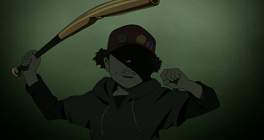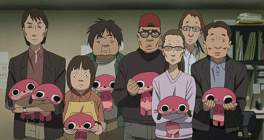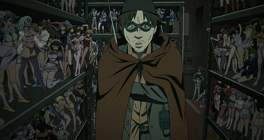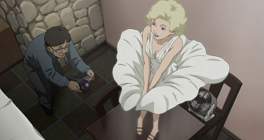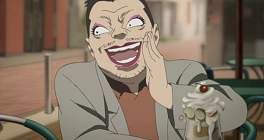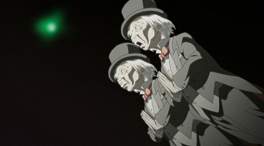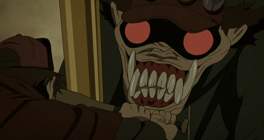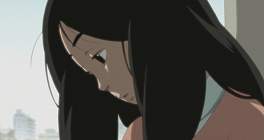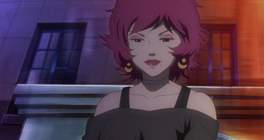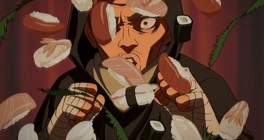First released: February 2004
The story goes that after Satoshi Kon's movie triumvirate - Perfect Blue, Millennium Actress, and Tokyo Godfathers - there were a surplus of ideas and the desire to break from being locked into a two and half year development cycle for movies. So with the aid of Madhouse studios, Paranoia Agent was born. Demonstrating a familiar mix of reality bending, mind melting storytelling and a flair for the symbolic and layered, the series is a stunning achievement shifting from detective thriller to black comedy to erudite social commentary with jaw dropping ease. Challenging and subversive, this is everything a Satoshi Kon fan could want: a playground where he runs free; as bleakly funny just as it is darkly incisive there are some minor hiccups along the way but it is a powerhouse of a series that rightly deserves but never demands attention.
That time just after waking, when dreams begin to be overwritten by reality but still linger in the mind, a zone of child-like wonder where thoughts have the power to change a person's reality and even their whole outlook - that is where the series operates. Characters are repeatedly caught in this state, their awakening captured but the preceding events left obscured, the episode itself becoming ephemeral and dream-like rather than a firm reality that it seems all of the cast desire. The story delights in its eclectic collection of characters, showing them as successful and stable and then perverting them through circumstance, pushing them to the limit of sanity. Even children aren't exempt from the thralls of modern living that is continuously lambasted, turning them from chaste and innocent to suicidal, deranged and strung-out.
The reliance on media and man-made idols has been explored before, but here it is given tangible form through Maromi: an amorphous pink dog based upon Tsukiko Sagi's childhood dog. Tearing into the kind of acute consumer culture seen in mega-franchises such as Hello Kitty, Maromi is everywhere and it becomes not only an integral part of the story's environment but ultimately its undoing - a jab perhaps at the perceived regression and anthropomorphisation Japan is purportedly in the grip of. This and many other indictments of the grotesqueries of Japanese society permeate the series, as such it's at its best when entirely irreverent and poking fun at everything from suicide to animation production, house wives to prostitution, popular media and all manner of other social idiosyncrasies.
This neatly divides the series into three parts: the opening episodes look at the formative attacks of Lil' Slugger and the intertwined lives of his victims, the meandering later episodes demonstrate the influence of Lil' Slugger as an idea, and the finale which ties up the story only to have it unravel in the final moments and loop right back to the start again. Although expertly paced, the series loses the momentum of the story so carefully built up in the opening third and it can seem needlessly obtuse to cover supposedly unrelated characters and events with only the phantom attacker as the hook. It is these episodes that are the most free though and through the collection of gossiping wives' tales and sojourns through the country, modern culture is plundered and wildly parodic art styles experimented with.
A shame that it these episodes which see the biggest dive in quality with some scenes nigh on unrecognisable from the emotive and graceful beauty present both before and after. Characters such as the demure Tsukiko are gifted a cherubic prettiness, while the detective Keiichi has a world weariness and wisdom to his features, even the slimy and reprehensible reporter Akio is wonderfully expressive. Thankfully it is mostly minor characters that are bent and distorted by budget restricted artists, Keiichi's wife the most noticeable going through several different but equally haggard forms. Backgrounds on the other hand are detailed throughout and have the variation but sadly not the tactility of the director's cinematic features.
It is easy to see the progression through each of Satoshi Kon's films, whereas those produced prior to Paranoia Agent demonstrated differing themes and approaches, the director left an indelible stamp that was gradually refined. This series then is far more Perfect Blue than Millennium Actress, but it is in his successive film Paprika that a great many themes formatively explored here are shared: dreams affecting reality and the fantasies and delusions of the "ordinary" man being high on the list. Perhaps the greatest masterstroke the series achieves though is making the symbolism part of the narrative, but never demanding that it be understood to attain comprehension. Certainly there is merit to decoding the peculiar "Prophetic Visions" babbled by the sharply dressed old man at the end of each episode, or understanding the relationship each character has with a species of animal or insect but these don't hamper enjoyment or stand out as beacons of contention.
The series is also not the most accessible Satoshi Kon work, either when it was released or in retrospect. The jump in cognition that the reality of Lil' Slugger requires will be enough to sour a casual viewer if they haven't already been chased away by the dawdling middle third; however the opening story that plays to well known detective and buddy cop stereotypes is strong enough to lure a viewer in, drip feeding information until the finale. With a director and animation studio in synchronicity, a cast comprising stalwarts of many an anime including Mamiko Noto, Shozo Iizuka and Toshihiko Seki, and the music director Susumu Hirasawa, most notable for his work on Berserk, Paranoia Agent would be hard pressed to be anything other than utterly stunning. It is a landmark in all regards and provides a rich seam of social commentary and reinforces Satoshi Kon's position as a director and creator extraordinaire. It is a series worthy of his name and equally of everyone's time and though it may not completely transcend its media, it is closer than many series could ever hope for.

